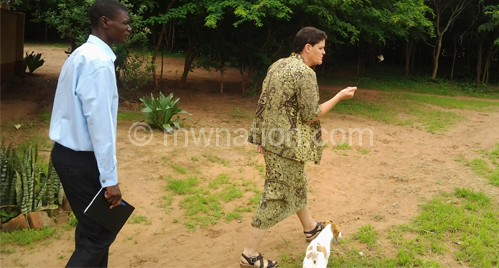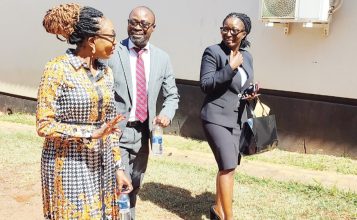A shadow MP from overseas

A Dutch nurse that Rumphi residents know as a benevolent ‘mzungu’ will not sit back and observe May 20 polls pass by. she wants to be on the ballot. JAMES CHAVULA writes.
For visitors, ‘when in Rome do as the Romans do’ is simply a survival strategy.
But Eva Demaya Centre director Jacqueline Kouwenhoven will not only join the locals in Rumphi West Constituency in traditional dances and improving their well-being.
With just a few months to the May 20 Tripartite Elections, the Dutch philanthropist has joined the scramble for space on the ballot paper, saying she will stand as independent parliamentary candidate.
For the expatriate Vimbuza dancer with some chiTumbuka proficiency, this is the beginning of a long suppressed political career—another chapter of a life story that dates back to 2001 when she and her husband, Scott John Fox, arrived in Malawi and founded a rural health centre at what has blossomed into a development centre in Luviri, Rumphi.
She speaks like Malawian politicians too.
Announcing her ambition last week, she said: “People have persuaded me to stand as an independent parliamentary candidate on May 20. In 2004 and 2009, I refused completely. Now that the centre is established, I gave it a thought and agreed.”
The setting? Her 13-year-old multifaceted development centre whose impact she confesses is central to her candidature. Touring the site at the foot of the scenic Chankhomi Mountain, one is immediately awestruck by the shrubs, trees and grass that cover nearly every inch of the terrain at a time many hills are lying bare due to wanton cutting down of trees and charcoal making.
“The mountain was almost naked when we arrived 14 years ago and it took us two years of deliberations with Paramount Chief Chikulamayembe to win the rights to protect the trees,” says Kouwenhoven of the forest with picturesque postcard views for both travellers and environmentalists.
The environmental conservation initiatives also include manufacturing of stoves which use less wood than ordinary burners and biogas technology where Raphael Nyuma Chitete turns cow dung into methane gas used for cooking.
Locals confess thinking it was silly for a couple from overseas to champion the restoration of the bush which they remember as a paradise for such life-threatening wildlife as nkhomi, the flying cobras after which the hill is named. However, the renewed setting has become a fountain of life because it embodies an array of scarce services, including specialised clinics.
Snaking in the pathways overshadowed by the thickets, the first stop is at a glass-thatched maternity wing where at least 12 babies come to life every month. All buildings are made with local materials and designed to resemble the architectural uniqueness of the huts that dot the villages in the vicinity. Complete with a four-bed waiting room, a labour ward and post-natal unit, the maternity wing saves lives that could be lost beyond the eye of skilled health workers.
“Before we opened the maternity section, pregnant women in Luviri were enduring long distances to deliver at the nearest health centres in Bolero or Mwazisi. Now, they have easy access to a nurse-cum-midwife who works here,” she says, chorusing the safe motherhood song that no life should be lost while giving life.
Even government has adopted guidelines requiring that no childbirths occur at home, at the hands of the unskilled birth attendants or on the way to the nearest clinic. Key to this is the edict that all women should report to the nearest healthcare facility in time for delivery.
However, the nearest health facilities for Luviri community lie 15 kilometres away, subjecting women to unwanted delays or reluctance to seek clinical services—the major reason 675 lives are lost in every 100 000 live births in Malawi, according to government.
A short walk from the establishment lessening maternal mortality rates is a shrine where herbalist Mannet Mfune, nicknamed Dr Tawona, runs a shrine for traditional medicine and vimbuza healing dance. Dr Tawona and Kouwenhoven have a diverse collection of medicinal plants, including mubabani, a bitter herb which locals believe to be a potent cure for malaria.
“I believe the herbs have medicinal value and there is need to harness local knowledge to beat the health challenges affecting the local community,” explains Kouwenhoven.
A mother of five, Dr Tawona, 40, is not your usual herbalist. Every day, she warns visitors to her shrine: “We are not here to divine diseases as many herbalists do, but to prescribe herbal drugs according to the symptoms”
Ordinarily, every prescription is a tree in danger. However, the two say the beauty with tropical herbal medicine is that no tree is felled, for they only use a pert or two—the leaves, barks or roots.
Besides the herbs, whose dosage and efficacy is heavily doubted in lecture rooms of medical studies, there is vimbuza dance which Kouwenhoven and company believe to be effective in cleansing the body, mind and soul. She has learnt to dance the Tumbuka healing dance and Eva Demaya workers confirmed that she joins people from the neighbourhood in Dr Tawona’s temple in the dance every Friday night. While she understands Tumbuka language, community members consider the vimbuza antics her single most important step into the heart of their way of living.
Above all, natives used to hold nocturnal vimbuza festivals in the shadow of a big tree which once stood at the spot occupied by the temple.
“I didn’t want to disturb culture,” says the person who is destined to become the second Dutch national to sit in Malawi National Assembly if she wins. The first was Blantyre Kabula’s Jaap Sonke (1999-2004).
“Don’t disturb” is a buzzword at Eva Demaya. Opposite the vimbuza stand is a nursery of exotic trees for firewood to avoid disturbing the protected forest as local dwellers cut down trees in search of affordable fuel.
There is also a fully stocked health centre which sees 15 patients every day. The turnout increases in the rainy season when rapid breeding of mosquitoes makes malaria widespread.
“The facility is priceless to the community because it saves lives and lessens the burden of exhaustion they suffer walking to Bolero or Mwazisi where health workers now attend to fewer patients than previously,” says registered nurse and midwife technician Maron Beza who often visits the centre.
On the site, the Rumphi District Health office supports Thumbiko Clinic where surrounding communities access HIV testing and counselling (HTC) easily. According to HTC counsellor Lillian Gausi, three to four people test HIV-positive everyday and 122 are receiving free antiretroviral therapy (ART).
“Minus this ART clinic, many people would be dying of HIV-related conditions without knowing their status,” says Gausi.
Every week, she dispatches blood samples to Rumphi for CD4 count tests so that those with low immunity can start taking life-prolonging drugs on time.
So respected is the solar-lit Eva Demaya campus that Kouwenhoven says its impact is actually the reason people have been coming to ask her if she is interested to represent them as an MP.
“Now the centre is complete, I gave it a thought and started consulting my family, friends, donors and board members of the centre. They all encouraged me to contest as an independent,” she said.
You would be forgiven for mistaking this for a clinched statement from a Malawian politician’s mouth. It is not new on the scene. We have heard it many times that one wonders why the Dutch national wants to soil Eva Demaya’s success story of humanitarianism in the murky world of prevailing politics which is scandalised by mudslinging, greed, corruption and petty conflicts.
Is she a Malawian?
“After consulting on my political path, I applied for citizenship in September 2012, the minister signed in October and by December I had the papers. Having lived in the country for 14 years, I had already decided Malawi was going to be my country, my home,” said Kouwenhoven.
She promises to avoid dirty politics by strictly delving into issues that will help develop Rumphi West, a remote locality with ragged roads which she calls “a beautiful setting I cannot trade with life in the city if I win. Contrary to her compatriot Sonke’s run, she pledges never to accept any ministerial appointment.
“If you win as an independent and decide to join party politics, you betray the electorate. This is something I pledged never to do to my people and there is already enough value since the donors don’t want me to join partisan politics,” she says,
But whose interests is she seeking to represent? The electorate or Eva Demaya’s donors spread in Switzerland, Holland, Scotland and other parts of Europe?
“Both,” she says, “except the donors feel it is easier to safeguard the independence of the centre as an independent candidate and they want to help develop the area which deserves a good road and other facilities.”
With the road a primary project in her manifesto and songs ready for her campaign, Kouwenhoven faces a litmus test to show her constituents that she can go beyond speaking like a typical Malawian politician and represent them differently.
But she seems to know this is not as simple as learning to dance vimbuza.
“To be honest, I’m excited with the new challenge,” she says.






Interesting candidate for parliament for Rumphi West constituency: a Dutch national (now Malawi citzen) who is providing needed healthcare to folks in Rumphi has been persuaded by the locals to seek representing them in parliament. She has accepted and is running as an independent candidate. Pledges not to accept ministerial appointment if she wins and someone were to ask her. She wants to avoid partisan politics as much as possible. Please read full story: